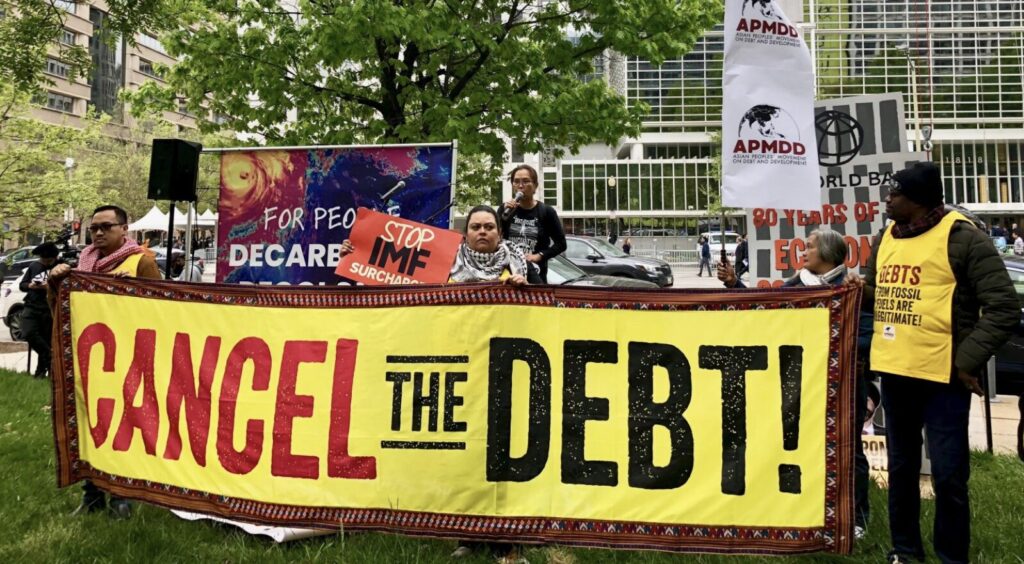Opinion: Who Is Benefitting? Neo-colonialism and Climate Finance

Demonstration in front of the IMF building, Washington D.C., April 2024. Photo: Russ Vernon-Jones
Love, Justice, and Climate Change

It has recently been reported that in 2022 the wealthy nations finally met their commitment to provide $100 billion per year in climate finance to the nations of the Global South. This might appear to be cause for celebration, but there is a not-so-pretty side to this story as well.
Background
In 2009 the wealthy countries agreed that by 2020 they would provide the less wealthy nations with $100 billion per year to support climate action. That goal was reaffirmed in the Paris agreement in 2015. There are two major reasons for this aid to go from the wealthy Global North nations to the lower-income Global South nations.
- The climate crisis has primarily been caused by the emissions of the wealthy nations while the major burden of its effects have been borne by the lower-income nations. This aid is essentially payment for having harmed the Global South nations. It is a debt owed by the Global North nations. (The wealthy nations have never agreed to put this rationale in writing, but the moral obligation is clear.)
- Humanity will not be able to solve the climate crisis unless all nations end their greenhouse gas emissions. There’s no way the lower-income nations can afford to do this without help. So it is in everyone’s interest to provide the Global South nations with the financial resources they need for climate action.
So, these payments are not some sort of generosity or gift. They are morally owed and in everyone’s self-interest.
Too Little, Too Late
The failure of the wealthy nations to meet this longstanding target by 2020 has been “a dark cloud over the UN climate negotiations, eroding trust and stymying progress” according to Ani Dasgupta of the World Resources Institute. It’s also clear now that $100 billion per year isn’t nearly enough money for the damage being done by the climate crisis or for the changes needed in the less-wealthy nations to transition to renewable energy and adapt to climate change. Current estimates are that at least $1 trillion per year is needed from outside sources for climate action in the Global South. Thus, the $100 billion may be a good thing, but it’s “too little, too late.”
What’s Being Counted
Serious questions have been raised about what’s being counted in the $100 billion. Analysis by the Center for Global Development finds that around $27 billion of the aid actually came from existing development aid simply relabeled as “climate funds.” This, despite clear agreements that the climate finance should be “new and additional.”
Enriching the Wealthy Nations
To my mind, the bigger problem is that a Reuters Special Report found that this aid, “meant to help developing nations fight climate change, is funneling billions of dollars back to rich nations.” First, more than two-thirds of the climate aid in 2022 was in the form of loans, not grants. This means that the recipient nations now not only have to pay back the funds received, but also need to pay interest on the loans.
This is especially problematic because 54 nations are already in debt crisis, with debt payments already reducing the funds they can spend on health care, education, and basic services for their people, much less climate change. This is an issue with all aid to the Global South. A new study finds that in 2024 the Global South is expected to pay $50 billion more debt repayment and interest than it receives in grants and loans.
Neo-colonialism
While this may seem incredible, it is consistent with everything I’ve been learning recently about how the global financial system is structured to benefit the wealthy nations. This is what is meant by “neo-colonialism.” While the Global South countries are no longer “colonies,” ruled by the wealthy nations, they are still being systematically exploited and dominated by the wealthy nations. Some estimate that the Global North continues to extract wealth from the Global South at the rate of $2.2 trillion per year.
Of the more than $100 billion in “climate aid” in 2022, at least $11 billion of the loans and more than $10 billion in grants required the recipient nations to use much of the money to purchase materials or hire firms from the donor nations. In this way the profits and economic stimulus to industry go to enrich the lending nation, while the recipient nation accrues more debt.
Looking Ahead
In 2015 nations agreed that in 2024 they would set a “new collective quantified goal” (NCQG) on climate finance to replace the $100 billion per year goal. Meetings are happening now in which representatives of many nations are negotiating how big the new goal will be, where will the funds come from, who receive them, and what their characteristics will be. The lower income countries are already proposing that the new goal be at least $1 trillion per year. Proposals are being made to tax fossil fuel companies, financial transactions, big tech, fashion, and defense industries and to mobilize private finance.
Opportunities
It remains to be seen what all the countries will be able to agree on at COP29 at the end of this year. Regardless, there will be opportunities for each of us in the wealthy nations to advocate for our governments to provide their fair share of funding for climate action, especially for the Global South.
Russ Vernon-Jones was principal of Fort River School 1990-2008 and is currently a member of the Steering Committee of Climate Action Now-Western Massachusetts. He blogs regularly on climate justice at www.russvernonjones.org.
